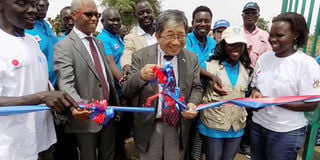Farmers to benefit from Shs1.8b solar-powered irrigation scheme

Launch. Mr Kazuaki Kameda, the Japanese ambassador to Uganda, commissions the Shs1.8 billion solar powered irrigation scheme in Moyo District on Tuesday. PHOTO BY SCOVIN ICETA
What you need to know:
- Aim. The project is aimed at aimed at strengthening and improving livelihood of both the refugees and the host communities.
- Uganda has been hosting a large number of refugees with more than 1.2 million mainly concentrating in West Nile sub-region. The refugees come from South Sudan, Democratic republic of Congo and other neighbouring countries.
Moyo. Farmers under Robijame Farmers’ Group in Palorinya East Village, Itula Sub-county in Moyo District, are set to benefit from Shs1.8b irrigation scheme project developed by Food and Agriculture Organisation (FAO) with support from the government of Japan.
Speaking during the launch of the scheme on Tuesday at Palorinya East Village, Mr Abraham Lou, the chairman of Robijame Farmer Group, said the irrigation scheme system will address challenges of water scarcity faced by the community.
“We used to fetch water from River Nile using jerricans but the process is tedious. We will be in position to irrigate our crops as a result of the available water. It is a positive project aimed at improving our livelihoods. We projected to raise Shs50 million before July,” Mr Lou said.
Improving livelihood
Mr Steven Alatawa, the regional programme coordinator for Community Empowerment for Rural Development (Ceford) West Nile, said the project is also aimed at strengthening and improving livelihood of both the refugees and the host communities.
“This is to ensure that both communities are able to create self-reliance so that they are able to earn income. Because of livelihood challenges, refugees sell their food items to support their households. And the farmers will now produce enough food during dry seasons for their wellbeing,” Mr Alatawa said.
Mr Antonio Querido, the Country representative of FAO, said through this project, the government of Japan has supported more than 9,000 households in Moyo and Yumbe districts to boost their income generating activities.
“By funding this project, the government of Japan has demonstrated commitment to having refugees become self-reliant. We appeal to them to renew their commitment as we gather to share and celebrate the milestone achievements of the project, particularly the completion of solar-power irrigation scheme that would support the host community to produce sustainable market,” Mr Querido said.
FAO says since 2015, the support given to refugees and the host community has reached more than 367,000 beneficiaries.
The ambassador of Japan to Uganda, Mr Kazuaki Kameda, said agriculture is not only for food security and nutrition but also a means of livelihood improvement where people are predominantly engaged in farming.
“FAO has been selected to benefit from Japanese supplementary budget for implementing this project because of its rich experience and expertise in agriculture. The commitments made by the beneficiaries who voluntarily save money from the sales of their vegetables and invested it for purchasing water pump in order to further increase its production is great,” he said.
Uganda has been hosting a large number of refugees with more than 1.2 million mainly concentrating in West Nile sub-region.



